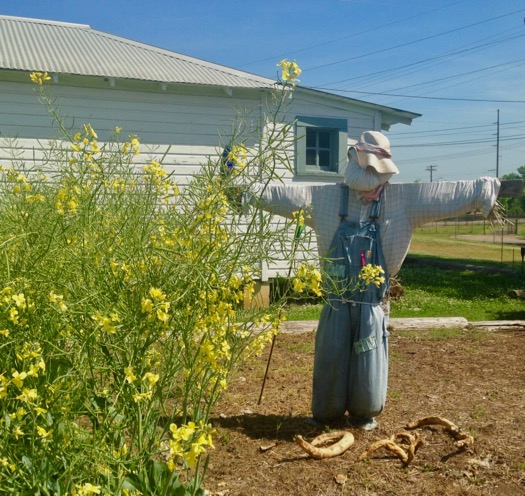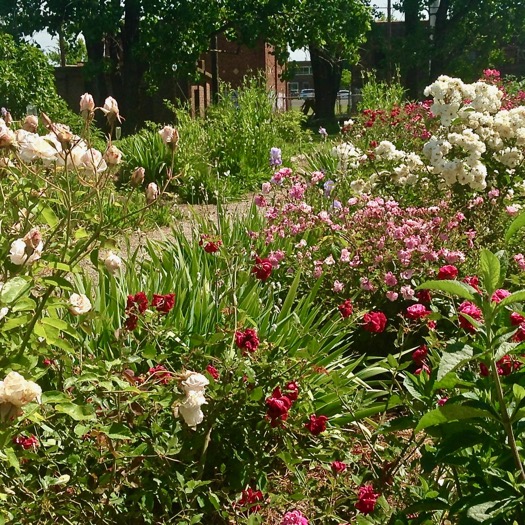Grandmother's Garden at Sloss Furnaces
 Saturday, May 12, 2018 at 6:00AM
Saturday, May 12, 2018 at 6:00AM  Long ago in another era, rivers of molten metal flowed out of Sloss Furnaces in Birmingham, Alabama, during the production of pig iron, which was used for conversion into steel, cast iron, and wrought iron. Slag, a stony waste product, was discarded nearby, and for many years the colossal pile of slag continued to grow. Sloss finally discovered that slag could be crushed and sold for road and railroad ballast. The company also sold pulverized slag as "Farmer's Friend," an alkaline product similar to ground limestone, used to amend acid soils.
Long ago in another era, rivers of molten metal flowed out of Sloss Furnaces in Birmingham, Alabama, during the production of pig iron, which was used for conversion into steel, cast iron, and wrought iron. Slag, a stony waste product, was discarded nearby, and for many years the colossal pile of slag continued to grow. Sloss finally discovered that slag could be crushed and sold for road and railroad ballast. The company also sold pulverized slag as "Farmer's Friend," an alkaline product similar to ground limestone, used to amend acid soils.
Silent now, Sloss has become a national landmark claimed to be haunted by specters of the past. In 1985, a six-room wood-framed cottage, built around 1905 by the Duncan family, was donated to the Birmingham Historical Society. It was moved to the slag area adjacent to Sloss Furnace to serve as a headquarters office for the Society. It also serves as an example of a type of house that would have been inhabited by furnace supervisors residing in Sloss Quarters. A three-room, shotgun-style home, similar to those used by managers and workers, is also on the site.
 The Duncan house has a porch covered by 'Peggy Martin' rose.Grandmother's Garden was begun behind the Duncan house in 2006, as a project with the Alabama Cooperative Extension System. But what to do with all that slag? Why, plant a garden on top of it, of course! We gardeners do like challenges, but initial efforts to till the ground broke the tiller blades! In 2007, raised beds were built. Underlaid with the porous slag, drainage is excellent, and plants that like alkaline soil flourish.
The Duncan house has a porch covered by 'Peggy Martin' rose.Grandmother's Garden was begun behind the Duncan house in 2006, as a project with the Alabama Cooperative Extension System. But what to do with all that slag? Why, plant a garden on top of it, of course! We gardeners do like challenges, but initial efforts to till the ground broke the tiller blades! In 2007, raised beds were built. Underlaid with the porous slag, drainage is excellent, and plants that like alkaline soil flourish.
Grandmother's Garden represents a long-ago era when families ate primarily from home gardens. These gardens contained mainly vegetables and herbs used for cooking and medicine. Worker's house and vegetable garden
Worker's house and vegetable garden Ornamental plants usually were roses, hollyhocks, and peonies, and a few "porch plants" grown in pots.
Ornamental plants usually were roses, hollyhocks, and peonies, and a few "porch plants" grown in pots. These are some of the roses at Grandmother's Garden.
These are some of the roses at Grandmother's Garden.
 I tasted mulberries for the first time in my life at Grandmother's Garden. The dark blue, ripe ones were very sweet and delicious. Now I want a mulberry tree!.Plantings at Grandmother's Garden reflect plants that were available to Birmingham residents in the early 1900s. An alternative to genetically altered crops, these "heirloom" plants are time-tested and easy to grow. In addition to evoking fond memories of bygone times, native Alabama heirlooms also are very well adapted to our climate and are often disease resistant.
I tasted mulberries for the first time in my life at Grandmother's Garden. The dark blue, ripe ones were very sweet and delicious. Now I want a mulberry tree!.Plantings at Grandmother's Garden reflect plants that were available to Birmingham residents in the early 1900s. An alternative to genetically altered crops, these "heirloom" plants are time-tested and easy to grow. In addition to evoking fond memories of bygone times, native Alabama heirlooms also are very well adapted to our climate and are often disease resistant.
According to the Birmingham Historical Society, research shows that heirloom plants also:
*taste better, with stronger flavor than modern versions
*provide greater yields
*help preserve genetic diversity
*require less chemical spraying
*help feed pollinators that find hybrid varieties less attractive
*support organic gardening practices
These photos of Grandmother's Garden give you an idea of the urban setting:

For more information about Sloss Furnaces and to see some interesting photos, read my previous post, Sloss Furnaces: A Blast From the Past.
Also, the photo at the top of this post is of an 'American Beauty' rose growing at Grandmother's Garden, which I photoshopped to give an artistic flare.
Reader Comments (9)
Thank you for the tour! I love history and any garden that goes with it. It's wonderful to see restoration and preservation. With a little imagination, what seems like waste land can become something beautiful. An oasis in the middle of urban America!
My sister's neighbor had a Mulberry tree by her back door, in Maine. I'd never seen them before let alone tried them. They were delicious. A friend, here in MA, had a number of them in her backyard and never got a berry because the birds devoured them which makes me think there was a good reason the Maine Mulberry was by the backdoor......
Thank you for the very Interesting tour and the garden information. Wow! Broke the tiller blades!
I like heirloom plants because they take usually less water and maintenance once established. I was delighted to find a wild mulberry sapling growing near or house as we cleared overgrowth. Unfortunately, research showed they are intense pollinators, and it had to go given its proximity to the house and hubby's acute allergies. Would love to find one to plant at the rear of our property.....
That 'Peggy Martin' rose is remarkable. One of the gardens I visited in Austin has one but unfortunately it was no longer in bloom when we visited. The thought of peonies growing in a cottage garden like this makes me green with envy!
It looked idyllic rural then suddenly you get a vista of its urban setting, love it!
Love the living history, especially its garden.
I love this sort of historic place. The roses are marvelous, and it's so important to preserve these heirloom varieties.
Thanks for sharing your visit.
I love articles like this that are about something I will likely never see. We'd probably all be healthier if we still ate from our own gardens. As a nation, we are eating too many processed foods that can hardly be called food. I have a Louis Phillipe rose that was given to me as a "stick" with a few roots. It is an old heirloom that requires trimming no spraying and blooms profusely. I am in love with it!
I tasted a mulberry in Atlanta once and I agree with you - sweet and delicious!
I hope to have a mulberry tree in my garden someday.
(PS - It's much harder to find a native mulberry - if that's something interests you - than an exotic one. But I think I'll try to find a native nonetheless, especially since they're apparently being displaced by the exotics and could probably used a little help...)